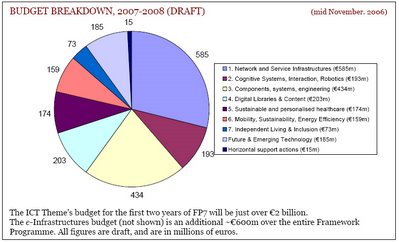ICTs enable us to access, create and share content widely. They also allow us to learn better, and to preserve and enrich our cultural heritage. Every day, however, brings us face to face with the shortcomings of current technologies, and the way they are used. We are often overwhelmed with information. We still have limited eLearning tools. And we are still just discovering the opportunities that ICTs offer for developing our cultural assets and reinforcing our creative potential.

The EU Member States have earmarked a total of € 9.1 billion for funding ICT over the duration of FP7; making it the largest research theme in the Cooperation programme, which is itself the largest specific programme of FP7 (with 64% of the total budget).
FP7 research activities will strengthen Europe’s scientific and technology base and ensure its global leadership in ICT, help drive and stimulate product, service and process innovation and creativity through ICT use and ensure that ICT progress is rapidly transformed into benefits for Europe’s citizens, businesses, industry and governments.
The framework program has several flagships such as European Digital Library; Intelligent Car; ICT for Independent Living in an Ageing Society; ICT for sustainable development. Of interest to me is the research under this Challenge developing digital libraries, enabling us to easily create, interpret, use and preserve cultural and scientific resources, and revolutionise learning through adaptive and intuitive ICTs. The flagship is to make Europe's diverse cultural and scientific heritage (books, films, maps, photographs, music, etc.) easier and more interesting to use online for work, leisure and study. It builds on Europe's rich heritage, combining multicultural and multilingual environments with technological advances and new business models.
On 1 February 2007 the European Commission will hold an information day on European ICT research and development in Cologne, Germany to present the Work Programme in more detail.
Tags: library
RSS feed: http://buziaulane.blogspot.com/rss.xml
Blog Posting Number: 613

No comments:
Post a Comment